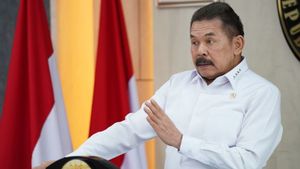JAKARTA - Deputy Chairman of the Legislation Body (Baleg) of the DPR RI, Achmad Baidowi or Awiek, responded to the polemic of the Draft Law (RUU) for the Special Region of Jakarta (DKJ) because Article 10 Chapter IV states that the governor was elected and appointed by the president. This means that there will be no elections in Jakarta.
Awiek explained that all factions in the DPR RI have been looking for the best solution when drafting the DKJ Bill so that democratic elements remain even without the regional elections. Referring to Article 14B of the 1945 Constitution, said Awiek, the Indonesian state recognizes special and or special regional units.
"To bridge the political desire between those who want specificity to be appointed directly, and so that we do not deviate from the constitution, find a middle ground that the governor of Jakarta is appointed dismissed by the president by taking into account the proposal or opinion from the DPRD," Awiek explained to reporters, Wednesday, December 6.
Awiek said the DPRD would later hold a trial to propose the names that would be made governors of Jakarta. So that the democratic process continues.
"So it's not completely the democratic process is gone, because democracy doesn't have to mean direct elections. Indirect elections also mean democracy. So, when the DPRD proposes, that's the democratic process there," said the Secretary of the PPP Faction.
In addition, Awiek added, so far direct elections in DKI have required large costs. According to him, it is better if the budget is allocated to the welfare of the people and development.
"That's what then makes us win-win solutions like that (without the Pilkada and the Governor of Jakarta elected by the President)," said the chairman of the DPP.
It is known that the DPR has officially ratified the Bill on Special Regions for Jakarta (DKJ) to become the policy of the DPR's initiative in the 10th Plenary Meeting of the Second Session Period of 2023-2024 at the Parliament Complex, Jakarta, Tuesday, December 5.
Eight factions agreed that the DKJ Bill was ratified as an initiative for the DPR while one faction, namely PKS refused.
PKS considers DKI Jakarta still worthy of being the capital city of Indonesia. They also rejected the DKJ Bill which consisted of 12 chapters and 72 articles.
For information, Baleg has agreed on five points related to the DKJ Bill through a plenary meeting on Monday, December 4. First, DKJ Province is an autonomous area at the provincial and administrative levels at the district/city level.
Second, the DKJ province is domiciled as the center of the national economy, global cities, and agglomeration areas. This region functions as a trade center, a center for service activities and financial services, as well as national, regional and global business activities.
Third, DKJ Province has several special powers in organizing local governments. Some of these authorities include the fields of culture, employment, education, management of coastal areas and small islands, and so on.
SEE ALSO:
Fourth, regarding and the aim of overcoming problems in Jakarta and its surrounding areas will be formed by the regional council. This council will synergize Jakarta's supporting areas, namely, Bogor, Tangerang, South Tangerang, Bekasi, and Cianjur.
Fifth, the Legislative Council (DPR) is obliged to monitor and review the candidate for policy so that the implementation of the law will run well and correctly in accordance with the politics of legislation.
The English, Chinese, Japanese, Arabic, and French versions are automatically generated by the AI. So there may still be inaccuracies in translating, please always see Indonesian as our main language. (system supported by DigitalSiber.id)


















